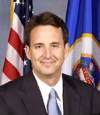Pawlenty VP Pick Would Be Rare: Slot Historically Reserved for D.C. Players
 Should John McCain pick Tim Pawlenty to be his Vice-Presidential running mate in the coming days, the selection would be a bit of a rarity, given recent political history.
Should John McCain pick Tim Pawlenty to be his Vice-Presidential running mate in the coming days, the selection would be a bit of a rarity, given recent political history.
During the past 14 presidential elections dating back to 1952, just 2 major party VP nominees had not served in the U.S. Congress: Spiro Agnew in 1968 (and 1972) and Sargent Shriver in 1972. (Vice President Nelson Rockefeller had also not served in Congress, but he was confirmed, not elected, during President Ford’s presidential tenure).
Most victorious tickets were comprised of VP nominees who had served as U.S. Senator: Al Gore, Dan Quayle, Walter Mondale, Hubert Humphrey, Lyndon B. Johnson, and Richard Nixon. Dick Cheney, Gerald Ford, and George H.W. Bush had both served in the U.S. House (Bush had also held the prominent positions in D.C. of CIA Director and United Nations Ambassador and Cheney was Secretary of Defense under Bush 41). Several of these VP nominees had also held notable leadership posts while in Congress, developing a national political base (Cheney was House Minority Whip, Ford was House Minority Leader for eight years, Humphrey was Senate Majority Whip, and Johnson had been both Senate Majority and Minority Leader).
Those nominees since 1952 who never became vice-president have also consistently been members of Congress. Most were Senators (John Edwards, Joe Lieberman, Lloyd Bentsen, Bob Dole, Edmund Muskie, Henry Cabot Lodge, Jr., Estes Kefauver, and John Sparkman) while a few served only in the House (Jack Kemp, Geraldine Ferraro, and William E. Miller; Kemp had also served as Secretary of Housing and Urban Development and Miller had been Chairman of the RNC).
Only two VP nominees since 1952 had served as Governor: Edmund Muskie and Spiro Agnew. Sargent Shriver had not been elected to any prominent office, though he had served in D.C. as Ambassador to France and Director of the Peace Corps.
In short, if selected, Governor Pawlenty would certainly stand out in terms of his lack of experience in D.C. and his overall lack of a national political base. However, Pawlenty would also stand out for his years of executive experience – experience few VP nominees have enjoyed. A Pawlenty pick would harken back to pre-1952 presidential elections when it was much more common to select VP nominees outside of D.C. (Henry A. Wallace, Charles G. Dawes, Calvin Coolidge, Thomas R. Marshall, Earl Warren, John W. Bricker, Frank Knox, and Charles W. Bryan to name a few).

That might be fitting, seeing that a Senator winning the presidency has been similarly rare over the same time period.